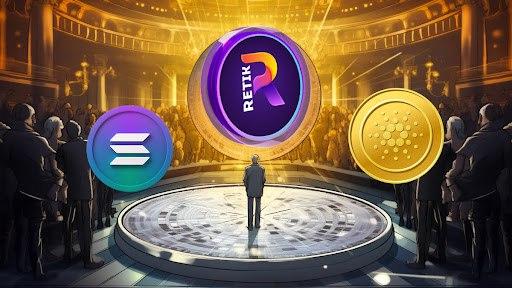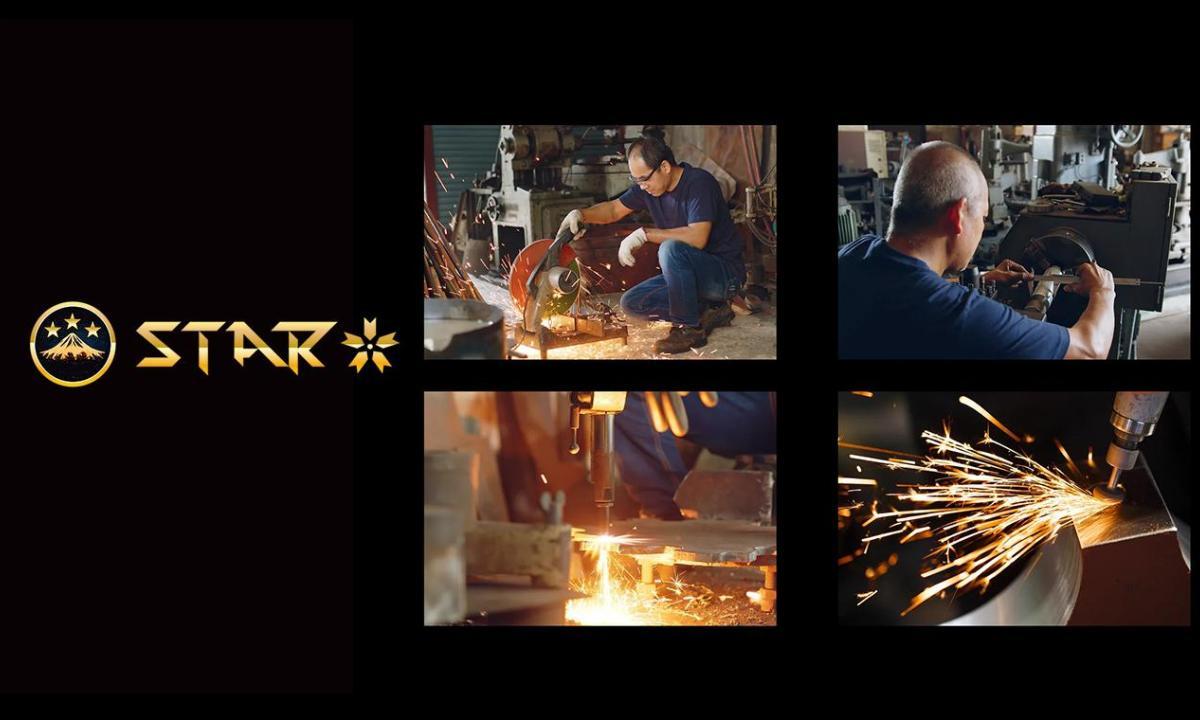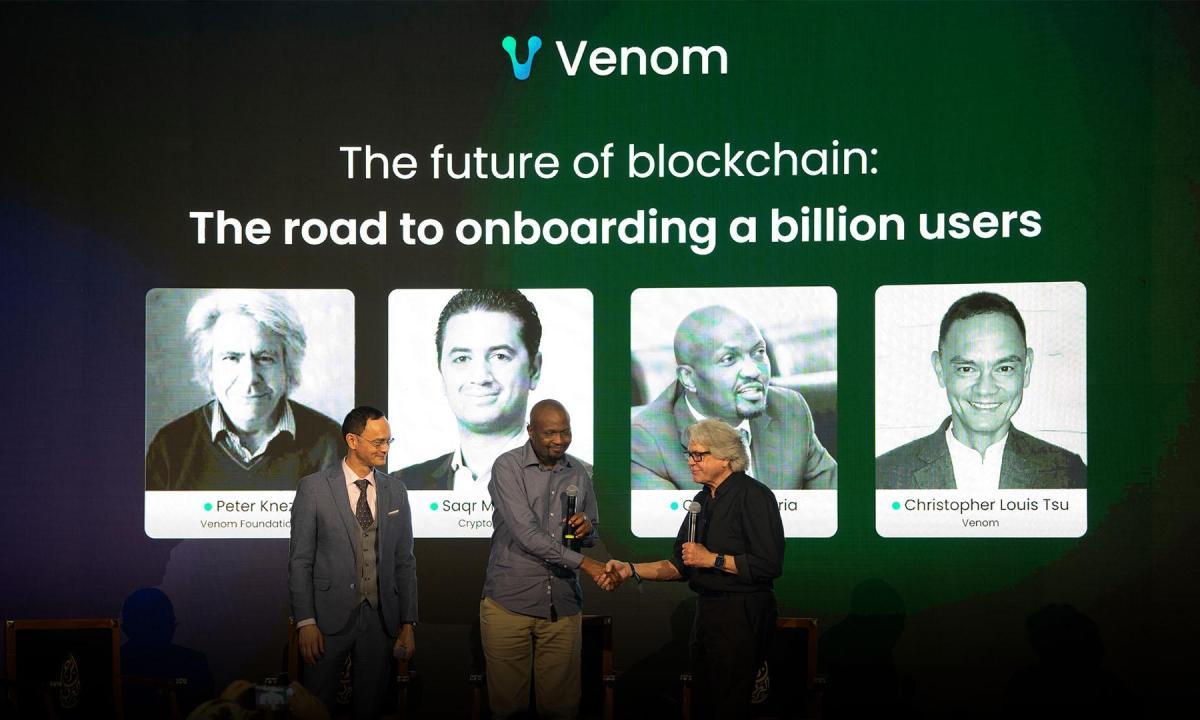Solana (SOL) and Retik Finance (RETIK) Preferred by Investors Over Cardano (ADA)
Two blockchain projects that have recently garnered significant attention are Solana (SOL) and Retik Finance (RETIK), both of which have been perceived favorably by investors in comparison to the well-established Cardano (ADA).
Solana (SOL)
Solana has emerged as a prominent player in the blockchain space, gaining recognition for its high-performance capabilities. One of the key factors contributing to SOL’s popularity is its fast and scalable network. Solana’s unique consensus mechanism, Proof of History (PoH), combined with Proof of Stake (PoS), enables rapid transaction processing and low fees, making it an attractive choice for users and developers alike. The Solana ecosystem has witnessed remarkable growth, with numerous decentralized applications (DApps) and projects choosing to build on its platform. This surge in adoption is indicative of the blockchain’s ability to handle a high throughput of transactions, a critical factor for the success of any blockchain project.
Investors are drawn to Solana not only for its technical prowess but also for its commitment to fostering innovation within the decentralized finance (DeFi) space. The Solana Foundation actively supports developers and projects, contributing to the expansion of the ecosystem.
Retik Finance (RETIK)
Retik Finance is a decentralized finance (DeFi) platform that has gained attention for its innovative approach. Retik Finance is at the forefront of innovation, offering an array of state-of-the-art features designed to transform global transactions. This includes cutting-edge offerings such as advanced DeFi Debit Cards, an intelligent Crypto Payment Gateway, AI-Powered Peer-to-Peer (P2P) Lending, and a Multi-Chain Non-Custodial Highly Secured DeFi Wallet. Particularly noteworthy is Retik Finance’s DeFi Debit Card, which not only provides advanced functionalities but also ensures user privacy through facilitating anonymous transactions, eliminating the need for Know Your Customer (KYC) processes. As Retik Finance progresses through its 5th presale stage, the native token RETIK is capturing considerable attention within the crypto community. The project’s success is evident in the active engagement of enthusiasts, resulting in an impressive total funds raised, currently exceeding $7.3 million. Simultaneously, Retik Finance is elevating the excitement with its mega $333,000 giveaway event, offering a golden opportunity for ten fortunate winners to acquire RETIK tokens, each valued at over $33,300. This confluence of cutting-edge features, community enthusiasm, and strategic fundraising initiatives positions Retik Finance as a dynamic player in the evolving landscape of decentralized finance.
Cardano (ADA)
Cardano, often hailed for its academic approach to blockchain development and its focus on sustainability, was one of the early players in the space. However, as the blockchain ecosystem evolves, Cardano finds itself facing competition from newer projects like Solana and Retik Finance. Cardano’s emphasis on peer-reviewed research and a layered architecture aims to provide a secure and scalable platform. Despite these strengths, some investors have expressed concerns about the relatively slower pace of development and adoption within the Cardano ecosystem.
Comparative Analysis: Solana and Retik Finance Preferred by Investors Over Cardano
Scalability and Transaction Speed
Solana’s innovative consensus mechanism allows it to achieve impressive transaction speeds and scalability, addressing one of the significant challenges faced by blockchain networks. This has positioned SOL as a preferred choice for applications requiring fast and low-cost transactions. RETIK, built on the Ethereum blockchain, benefits from the scalability and efficiency of ERC. This enables RETIK to offer high-speed transactions and low fees, enhancing the overall user experience. While Cardano aims for scalability through its layered architecture, critics argue that the network’s development progress has been comparatively slower. ADA’s transition to a fully decentralized network with its Alonzo upgrade is expected to improve scalability, but it faces stiff competition from faster alternatives.
Decentralized Finance (DeFi) Offerings
Solana’s DeFi ecosystem has flourished, with various projects and DApps gaining traction. Its support for DeFi innovations, combined with the network’s speed and efficiency, has attracted developers and users seeking decentralized financial solutions. Retik Finance specializes in DeFi, offering a range of yield farming opportunities and liquidity provision options. The platform’s emphasis on community governance and user-friendly features has contributed to its popularity among DeFi enthusiasts. While Cardano has expressed interest in the DeFi space, its progress in this regard has been slower compared to Solana and Retik Finance. The upcoming Alonzo upgrade is expected to introduce smart contract functionality, potentially expanding Cardano’s footprint in the DeFi sector.
Community and Developer Support
Solana has garnered strong community and developer support, evident in the growing number of projects and collaborations within the ecosystem. The Solana Foundation’s initiatives to support developers contribute to the overall vibrancy of the community. RETIK has cultivated an engaged community, driven by the platform’s commitment to transparency and user satisfaction. The active participation of the community in governance decisions enhances the decentralization aspect of the project. Cardano has a dedicated community, and the Cardano Foundation actively supports the network’s development. However, some critics argue that the pace of development and the need for greater adoption pose challenges for Cardano in maintaining its competitive edge. Moreover, Solana (SOL) and Retik Finance (RETIK) have emerged as formidable project, attracting investor interest for their high-performance capabilities and innovative approaches. Solana’s fast and scalable blockchain, coupled with its commitment to DeFi, has positioned it as a preferred choice for developers and users seeking efficiency. Retik Finance, operating in the DeFi space on the Ethereum blockchain, has gained traction with its unique yield farming model and user-friendly features. While Cardano (ADA) remains a pioneer in blockchain technology with a focus on academic rigor and sustainability, it faces growing competition from newer projects that offer faster development cycles and scalability. The upcoming Alonzo upgrade is expected to enhance Cardano’s capabilities, especially in the DeFi sector, but the project will need to navigate the competitive landscape carefully. Investor preferences are subjective and can be influenced by various factors, including technical features, community engagement, and the overall vision of a project. As the blockchain space continues to evolve, it will be interesting to observe how Solana, Retik Finance, and Cardano adapt to meet the changing demands of investors and users alike.
About Retik Finance
Retik Finance (RETIK) is a cutting-edge decentralized finance (DeFi) project revolutionizing global transactions with its innovative suite of financial solutions. Introducing futuristic DeFi Debit Cards, a Smart Crypto Payment Gateway, AI-powered Peer-to-Peer (P2P) lending, and a Multi-Chain Non-Custodial Highly Secured DeFi Wallet.
Click Here To Take Part In Retik Finance Presale
Visit the links below for more information about Retik Finance (RETIK):
Website: https://retik.com
Whitepaper: https://retik.com/retik-whitepaper.pdf
Linktree: https://linktr.ee/retikfinance
Stay informed with daily updates from Blockchain Magazine on Google News. Click here to follow us and mark as favorite: [Blockchain Magazine on Google News].
Get Blockchain Insights In Inbox
Stay ahead of the curve with expert analysis and market updates.
latest from tech
Disclaimer: Any post shared by a third-party agency are sponsored and Blockchain Magazine has no views on any such posts. The views and opinions expressed in this post are those of the clients and do not necessarily reflect the official policy or position of Blockchain Magazine. The information provided in this post is for informational purposes only and should not be considered as financial, investment, or professional advice. Blockchain Magazine does not endorse or promote any specific products, services, or companies mentioned in this posts. Readers are encouraged to conduct their own research and consult with a qualified professional before making any financial decisions. The featured image used is just a creative depiction of the title and it does not intend to hurt sentiments of any person or institution. If it hurts anyone sentiments, please do not hesitate to reach out to Blockchain Magazine.

 Bitcoin
Bitcoin  Ethereum
Ethereum  XRP
XRP  Tether
Tether  Solana
Solana  USDC
USDC  Dogecoin
Dogecoin  Cardano
Cardano  Lido Staked Ether
Lido Staked Ether  TRON
TRON  Wrapped Bitcoin
Wrapped Bitcoin  Chainlink
Chainlink  Wrapped stETH
Wrapped stETH  Avalanche
Avalanche  Sui
Sui  Stellar
Stellar  Toncoin
Toncoin  Hedera
Hedera  Shiba Inu
Shiba Inu  LEO Token
LEO Token  Hyperliquid
Hyperliquid  Litecoin
Litecoin  Bitget Token
Bitget Token  WETH
WETH  USDS
USDS  Polkadot
Polkadot  Bitcoin Cash
Bitcoin Cash  Ethena USDe
Ethena USDe  Wrapped eETH
Wrapped eETH  Uniswap
Uniswap  MANTRA
MANTRA  Ondo
Ondo  Pepe
Pepe  Monero
Monero  Aave
Aave  WhiteBIT Coin
WhiteBIT Coin  NEAR Protocol
NEAR Protocol  Mantle
Mantle  Official Trump
Official Trump  Aptos
Aptos  Dai
Dai  Internet Computer
Internet Computer  Ethereum Classic
Ethereum Classic  Bittensor
Bittensor  OKB
OKB  Cronos
Cronos  POL (ex-MATIC)
POL (ex-MATIC)  Gate
Gate 



